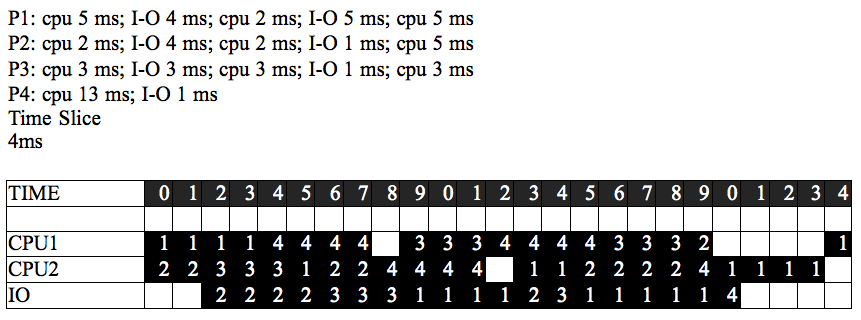Difference between revisions of "ProvaTeorica 2013.02.15"
Jump to navigation
Jump to search
| Line 113: | Line 113: | ||
</syntaxhighlight> | </syntaxhighlight> | ||
| + | <syntaxhighlight lang="C"> | ||
| + | |||
| + | // bar (z,t) <z= z xor t, t= t xor z, z = z xor t> | ||
| + | |||
| + | z t z t z | ||
| + | 0 0 0 0 0 | ||
| + | 0 1 1 0 1 | ||
| + | 1 0 1 1 0 | ||
| + | 1 1 0 1 1 | ||
| + | |||
| + | void Swap(boolean z, boolean t){ | ||
| + | boolean tmp; | ||
| + | z=t; | ||
| + | t=tmp; | ||
| + | } | ||
| + | </syntaxhighlight> | ||
<h2> Esercizio g.1 </h2> | <h2> Esercizio g.1 </h2> | ||
[[File:RoundRobin2cpu.png]] | [[File:RoundRobin2cpu.png]] | ||
Revision as of 15:30, 13 May 2014
Testo del compito
Esercizio c.1
/*
Esercizio c.1: (a) Scrivere un monitor dualwriter che realizzi un doppio buffer limitato (ogni buffer ha ampiezza
BUFSIZE) che consenta a uno scrittore di scrivere contemporaneamente due elementi che andranno rispettivamente
nel primo e nel secondo buffer. Le letture :
procedure entry void write(type1 e1, type2 e2);
procedure entry type1 read1();
procedure entry type2 read2();
La funzione write deve attendere che ci sia spazio in entrambi i buffer.
La funzione read attende che vi sia almeno un elemento nel buffer indicato
*/
monitor dualwriter
{
type1* buffer1;
type2* buffer2;
condition oktowrite,oktoread1, oktoread2
procedure entry void write (type1 e1, type2 e2)
{
if (sizeof(type1)>=BUFSIZE || sizeof(type2)>=BUFSIZE)
oktowrite.wait();
buffer1.push(e1);
buffer2.push(e2);
oktoread1.signal();
oktoread2.signal();
}
procedure entry type1 read1()
{
if (sizeof(buffer1)==0)
oktoread1.wait();
buffer1.pop();
if (sizeof(buffer2)<BUFSIZE)
oktowrite.signal();
}
procedure entry type2 read2()
{
if (sizeof(buffer2)==0)
oktoread2.wait();
buffer2.pop();
if (sizeof(buffer1)<BUFSIZE)
oktowrite.signal();
}
}
-stefano92
monitor dualwriter{
queue buffer1;
queue buffer2;
condition oktowrite;
condition oktoread1;
condition oktoread2;
procedure entry void write(type1 e1, type2 e2){
if((buffer1.len() == BUFSIZE) || (buffer2.len() == BUFSIZE)) /*se uno dei due buffer è pieno non puoi inserire*/
oktowrite.wait();
buffer1.enqueue(e1);
buffer2.enqueue(e2);
oktoread1.signal();
oktoread2.signal();
}
procedure entry type1 read1(){
if(buffer1.len() == 0) /*buffer vuoto*/
oktoread1.wait();
buffer1.dequeue;
oktowrite.signal();
}
procedure entry type2 read2(){
if(buffer2.len() == 0) /*buffer vuoto*/
oktoread2.wait();
buffer2.dequeue;
oktowrite.signal();
}
}
Giulia
Esercizio c.2
// foo(x,y) <x=2+y , y=2+x>
int g = 0;
csenter:
do
int l;
foo(l, g);
while(l!=2)
csexit:
g = 0;
// bar (z,t) <z= z xor t, t= t xor z, z = z xor t>
z t z t z
0 0 0 0 0
0 1 1 0 1
1 0 1 1 0
1 1 0 1 1
void Swap(boolean z, boolean t){
boolean tmp;
z=t;
t=tmp;
}
